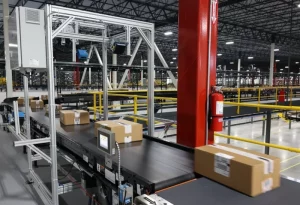Gary Cash was recently interviewed by DC Velocity regarding the warehouse software and controls markets and the state of the warehouse supply chain. Below is a brief summary of the main points from the interview.
Flexibility in Your Distribution Center
As we’ve learned from Covid-19, building flexibility is critical for adapting to changing market conditions, global supply chain risks, and major shifts in shopping behavior, all of which happened in 2020. The shift from brick-and-mortar–based retail to e-commerce has accelerated, leading to new ways of delivering product, such as buy online/pick up in store (BOPIS), home deliveries, and micro-fulfillment all becoming more commonplace. As a result, distribution centers need software systems that incorporate newer systems and technologies. Some examples are workload planning that accounts for social distancing needs and AMRs (autonomous mobile robots), which are very flexible and can minimize the number of people required in an area. Even when considering distribution centers that share similar product types and throughput, customers need flexible automation aligned with their unique needs and culture. That’s what we focus on for our customers – our software and controls engineering team willingly accepts the challenges presented by some of these unique requirements.Integrated Software Pays Dividends
Gary believes that one of the most important trends is to install more integrated and comprehensive software solutions that can continuously monitor performance, move work to where it is needed, and intelligently adapt as the workload changes throughout the day. Software designed to manage complex workflows can make fast changes to improve deliveries to stores, parcel shipping, or store pickup as needed, so, again, there are flexibility and efficiency benefits.Consider the Advances in Warehouse Execution Systems (WES)
The advent of more integrated WES software provides detailed process visibility for maximum throughput. It includes a wide range of real-time status updates on conveyor system sensors, the quantity and mix of incoming orders, the current workload at any point in the system, and other critical information. Advanced algorithms monitor that data and adjust automated subsystems throughout the day to maintain optimal work balance and flow. Whether customers use waveless or wave-based order processing strategies, WES is a real competitive advantage for those who have it.Other Automation Technology that Gives a Competitive Advantage
Light-directed systems (pick-to-light, put walls) are easy to deploy and deliver rapid boosts in productivity and efficiency. We’re working with several food-related brands challenged with sudden, massive increases in omnichannel order volume. Our picking technology is helping meal-kit delivery services meet skyrocketing e-commerce demand and other brands to successfully supply major retailers with fresh, ready-to-eat meals. We are also seeing rising adoption of light sleds, light frames, and picking carts that leverage the technology’s inherent flexibility to support multiple order selection and sortation techniques. To read the full interview, visit DC Velocity’s webpage here.About the Author
Gary Cash has spent his 30-year career designing automated material handling and manufacturing systems with a focus on software and controls.
Cash’s systems experience also includes product development for sortation systems, conveyors, palletizers, print-and-apply systems, automated storage and retrieval systems (AS/RS), and picking systems. He holds a bachelor’s degree in electrical engineering from Cleveland State University and an MBA from John Carroll University.



